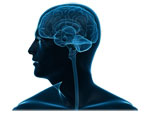Tagged with “diffuse tensor imaging”
June 10, 2021
A research report from the University of Texas Medical School, just published in Frontiers in Neurology, finds a correlation between Diffusion Tensor Imaging (DTI) findings and cognitive assessments in patients with chronic complaints after concussion, providing evidence that DTI imaging may be a reliable biomarker predicting the severity of cognitive decline following concussion. (DTI is an MRI technique that detects microstructural changes in white matter such as the changes that can occur as a result of “diffuse axonal injury” in brain injuries including concussion.) Read More
December 10, 2018
Researchers from Berkeley, Duke, UNC Chapel Hill and University of Arizona used a new type of MRI called “diffusion kurtosis imaging” (“DKI”) to take brain scans of 16 high school football players, ages 15 to 17, before and after a single season of football. DKI is an extension of Diffusion Tensor Imaging, (DTI) discussed in prior posts. Early studies suggest that it outperforms DTI in capturing certain microstructural changes in the brain. The football players who were scanned all wore helmets and none of them were diagnosed with a concussion. The researchers also measured head impact exposure during every practice and game using the Head Impact Telemetry (HIT) system, which has been widely used in other head impact studies. The study, which is the cover story of the November issue of the journal Neurobiology of Disease, is one of the first to look at how impact sports affect the brains of children at this age.
Read More
June 29, 2015
The Radiology Society of North America has published a new study that identifies particular white matter brain injury patterns in patients with persistent depression and anxiety following mild traumatic brain injury (concussion or mTBI.) Read More
January 5, 2015
The weight of scientific evidence demonstrates that “diffusion tensor imaging” is an effective tool for demonstrating damage to the white matter of the brain associated with mild traumatic brain injury.
The damage typically associated with mild traumatic brain injury (mTBI) is in the axons, the microscopic fiber tracts in the white matter of the brain too small to be seen by conventional tools such as MRI and CT. In fact an individual with a perfectly normal MRI and CT could even be in a coma due to a brain injury. Treatment providers have been left to infer injury from clinical symptoms. However, even the most commonly used clinical tools, such as neuropsychological assessment, are generally seen as insensitive to the subtle, but sometimes life altering, effects of mTBIs. Read More
December 8, 2014
Findings released on November 25, 2014 in the Journal of Neurotrauma indicate that the presence of a blood protein known as SNTF shortly after a sports-related concussion can predict the severity of post-concussion symptoms in professional athletes.
The authors of the study – Robert Simon, PhD, and Douglas H. Smith, MD, professor of neurosurgery and director of the Center for Brain Injury and Repair at the University of Pennsylvania – noted upon release of this study of SNTF in concussion patients that
“these observations lend further support to the growing awareness that concussion is not trivial, since it can induce permanent brain damage in some individuals.” Read More
May 27, 2014
Different symptom patterns of concussion depend on the precise nature of the damage to the brain
 Medical research is increasingly identifying the various ways a concussion can impact the brain and is providing explanations for why different symptoms persist in a subset of people diagnosed with concussion, based on the anatomy and physiology of the brain.
Medical research is increasingly identifying the various ways a concussion can impact the brain and is providing explanations for why different symptoms persist in a subset of people diagnosed with concussion, based on the anatomy and physiology of the brain.
Much of this recent research has benefited from new techniques to “image” the brain, including various MRI techniques such as “diffusion tensor imaging” (“DTI”). In a prior post, I discussed research concerning the subset of concussed patients who experience persistent ocular (vision) and vestibular (balance) problems. A paper published online on April 15, 2014 in the journal Radiology reported that DTI imaging of patients with these symptoms revealed damage in the parts of the brain know to be associated with vision and balance. Read More
December 4, 2013
In a study published November 18, 2013 in Frontiers in Neurology, researchers from Penn and Baylor report that they have identified a blood biomarker – SNTF – that if found on the day of injury predicts with substantial accuracy both cognitive impairment persisting more than 3 months and the existence of abnormal brain imaging finding in the corpus callosum and uncinate fasciculus of the brain (using diffusion tensor imaging (DTI). Read More
November 25, 2013
There has been much debate over what happens to the brain following a concussion, much of it recently focused on concussions in sports. One side of the debate maintains that concussions, also referred to as “mild traumatic brain injuries,” involve only a very short term disruption of brain function with no damage to the brain. As discussed in previous posts, this view has been discounted by a growing body of research involving advanced imaging technologies as well as post-mortem pathological studies showing that in a minority of cases concussions can cause lasting damage to the brain as well as persistent symptoms.
On November 20, 2013 the medical journal of the American Academy of Neurology, a professional organization representing 21,000 neurologists and neuroscientists, published findings that after a “mild” concussion, brain scans using diffuse tensor imaging technology, showed grey matter abnormalities on both sides of the frontal cortex. Read More

